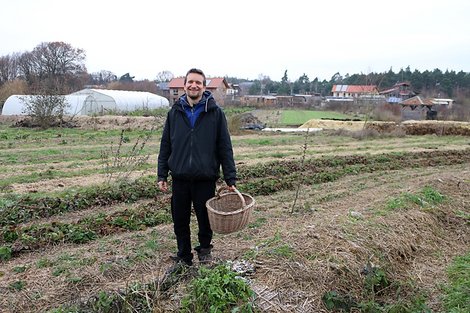Future of Food – Wilde-7 from Saxony-Anhalt

The online mail order company Wilde-7 sends out organically growing, edible wild herbs
Jörg Zimmermann reaches for his picking basket. Yes, wild herbs can be still found in winter. He lists them: ashweed, dead-nettle, chickweed, yarrow, ... The number of Germans living on them is growing. But where can one find these wild-growing vitamin bombs? And what do they look like? Very few people know. Jörg Zimmermann has developed a business idea from this and in 2008 founded a mail order company for edible biological wild herbs, in the ecovillage Sieben Linden, which is located in the region of Altmark in the north of Saxony-Anhalt, www.siebenlinden.de. In April, all fans of these green power plants can breathe a sigh of relief. Because it is the start of the new season.
Jörg Zimmermann walks over to the construction trailer. He remembers the children’s educational programme “Löwenzahn” (dandelion), which also drew many adults to the TV with its interesting topics relating to nature and the environment. The conversation quickly turns to “Did you know that the petals of tulips, hollyhocks, mallows and geraniums are edible? That wild herbs stimulate fat burning because of their high concentration of bitter-tasting compounds? That they contribute to the strengthening of the immune system due to their high chlorophyll content? That many wild herbs contain more vitamin C than a lemon?” Chickweed, gallant soldier and arrach contain more iron than lettuce or spinach, says Jörg Zimmermann, owner of the online mail order company Wilde-7. His customers still have to wait patiently until April, however. The reason for this lies in the definition of the term “wild herbs”: “They grow and multiply without people doing anything”, explains Zimmermann. Which means, by implication: “It is only when they form shoots that the harvest can really start; before that, there is only enough for personal use.”
It will be a few more weeks before Jörg Zimmermann’s trailer can emerge from its winter sleep, and herbs will once again be weighed, packed in shipping bags and labelled here. From the packing table under the window, one has a view of eight hectares of garden, reaching to the ecovillage Sieben Linden. Jörg Zimmermann, who specialises in purely vegetable, organic vegan agriculture, came here in 2003. He was employed as one of the gardeners who work for the village community. The native of Berlin had started studying Agricultural Science at the Humboldt University and switched over to the University of Kassel because of his environmental orientation. He explains that he found out about the ecovillage in the Altmark in a specialist magazine, while he was still a student. Sieben Linden is a district of Beetzendorf in the north of Saxony-Anhalt. Although there were certainly a few other ecovillages in Germany, the structures that the community here had given itself were suitable for his own family’s way of life, says the organic vegan gardener. He himself is a convinced raw food eater. This is to say he is one of those who live on untreated foodstuffs, and do not heat fruit or vegetables above 42 degrees, so as not to destroy the vitamins, minerals, enzymes and proteins they contain.
According to information from the German Vegetarian Society, there are almost eight million vegetarians among the German population – ten percent of the population. Around 900,000 Germans are vegans. According to the estimates of the Society, this group includes several thousand “strict” raw food eaters. On top of this there is the growing group of “part-time raw food eaters”, who consume exclusively fresh and non-heated food as often as possible or over a certain period of time.
But there are other groups of people who also have wild plants on their shopping lists. In particular, health-conscious city dwellers order from Wilde-7 – mainly because they want to use herbs to enhance the taste and healthiness of their meals, but lack the time and opportunity to gather them themselves, explains Jörg Zimmermann. In season, he and his helpers are already out on the village’s own garden area at dawn, to pick the still dew-moistened herbs. They are sent freshly packed to between 80 and 100 customers per week. “It amounts to 15 to 20 kilograms of herbs every week”, says the eco-gardener. His main product is the “seasonal mixture”, consisting of up to 30 different wild plants. The other items that can be ordered are listed and described at the online shop. “On request, we also go to home gardens, and take a look, together with the customer, to see which wild herbs are growing there”, says Jörg Zimmermann, speaking for himself and his business partner Michael Schönefeldt. The qualified physiotherapist from Sieben Linden is particularly interested in the healing effect of wild herbs.
Wilde-7’s knowledge of organic vegan cultivation and wild herbs has also garnered it a place in the international “Future of Food” mentoring programme. In 2014 and 2015, the EU project was supported within the Grundtvig Programme for adult education. “We have worked out teaching materials with partners from the Netherlands, from Spain, Hungary and Ireland and taken away good suggestions on methods for our regular seminars and workshops”, explains Jörg Zimmermann. The days during which participants visited each other and got to know the partners’ companies brought a major gain in knowledge, he says. It is things like this that really bring Europe closer together, adds the agriculturalist.
When he looks at the world, however, he bears the problematic subject of the “Future of Food” very much in mind. With their deep specialist knowledge, Jörg Zimmermann and his allies are contributing to the exchange of ideas regarding practices for a sustainable lifestyle. “We want to live as healthy people on a healthy planet”, he says.
Author: Kathrain Graubaum (text/photo)
Image caption: Jörg Zimmermann from the ecovillage Sieben Linden specialises in purely vegetable, organic vegan agriculture. In 2008 he founded the wild herb mail order company Wilde-7.
